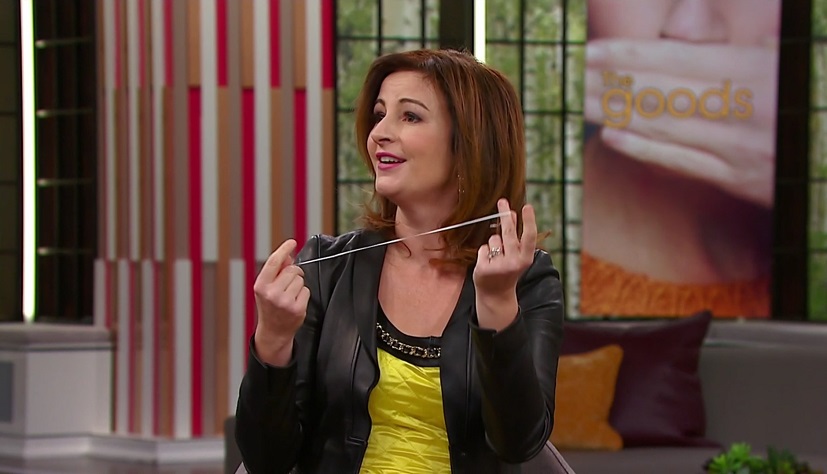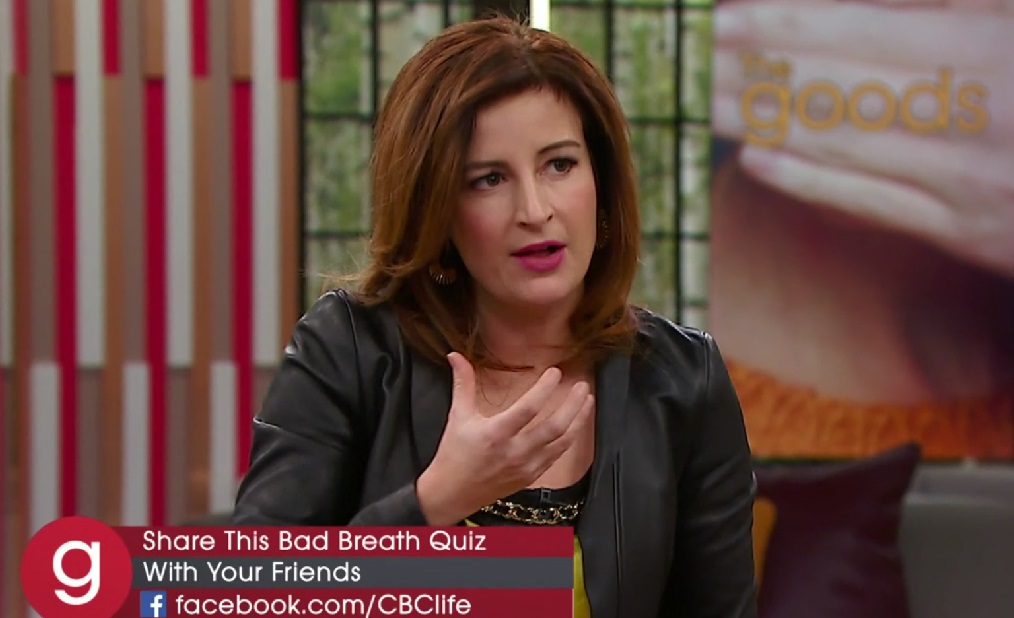
On Tuesday, Jan 22nd 2018, Toronto dentist, Dr. Natalie Archer appeared on Season 2 Episode 7 of the CBC daytime TV talk show, The Goods to share some quick facts about bad breath and the medical condition known as Halitosis. Even more importantly, Dr. Archer told the live studio audience and thousands of home viewers what they can do to help the situation if they’re among the 35% to 40% of all Canadians who struggle with bad breath.
With charismatic hosts and good audience interaction, the show is easy to watch and an effective teaching tool. In the ten-minute sequence, the in-studio audience gets their chance to vote ‘true’ or ‘false’ with coloured wooden paddles before Dr. Archer definitively answered a series of dental related questions. Dr. Archer’s replies were full of interesting and useful information and that, along with the audience participation, added drama and intrigue to what might have otherwise been a less exciting segment.

Wide shot of The Goods TV studio with Dr Natalie Archer discussing bad breath – courtesy of CBC, The Goods
Brushing and flossing regularly is your best defense against bad breath. True or False?
As you can probably guess, this is True, and almost the entire audience guessed this and waved their TRUE paddles. Careful, methodical, twice-daily brushing and flossing is the primary method of combating bad breath and keeping human mouths clean. And there’s a reason dental hygienists all tell their patients to floss regularly; flossing is one of the best ways to remove food particles from in between teeth. When food remains anywhere in the mouth, bacteria will break down the material creating a sulfur-like compound that gives off a fermented, bad-breath smell (aka. Dragon Breath or really bad morning breath). This is the reason why Dr. Archer recommends that patients floss their teeth before they brush for best results.
Dentists recommend using 10 inches of floss when cleaning teeth? True or False?
False. Ten inches is not enough! You need sixteen inches of floss or more to ensure you use a fresh part of the waxy thread between each tooth (so the cord won’t transfer food particles or plaque to other teeth as you clean). A great way to measure is to pull floss the length of your arm, from finger tips to elbow.
At this point one of the hosts asked about the value of Flosser Pics, the plastic spike with a little more than a centimeter of floss in a bow at the end. Are these valuable oral hygiene aids? Interestingly, Dr Archer is not the World’s biggest fan of these tiny plastic innovations. While she praised their ubiquity and convenience, she reinforced the notion that old school flossing with 16 inches of fresh dental floss twice a day remains the best choice for optimal oral heath.
Sugar-free gum is one of the best ways to combat bad breath temporarily. True or False?
True. Sugar-free gum, if chewed for five minutes or less, is a great way to freshen your breath. They keyword here is temporarily because this is not a long-term solution. Indeed, Dr. Archer recommends disposing the gum after only five minutes. The gum works because it stimulates the mouth’s own salivary glands, and for this reason, gum is better than candy or mints.
Why do babies and even toddlers never have bad breath? Babies don’t have bad breath because their mouths are full of saliva that helps keep their breath fresh. Anything adults can do to increase their saliva flow is beneficial, and so, conversely drinking alcohol or even using an alcohol-based mouthwash just before you retire for the evening is a terrible practice. Its detrimental to your salivary system and such alcohol-scorched mouths may end up drier, and potentially smellier in the morning than if they had not gargled before bed.
Bad breath sufferers can’t smell their own stinky breath. True or False?
True. In so many cases people just get used to all their own smells, and so will find it difficult to detect if they themselves have bad breath, especially as they get older. Asking a trusted friend seems to be the best way to get this critical unbiased information, and yet many people are too embarrassed to ask. The longer you ignore the problem, though, the worse it can get.
Persistent bad breath smell is usually a sign that something else is wrong, and more complicated dental issues exist in the sufferer’s mouth; these people should be examined by professionals.


